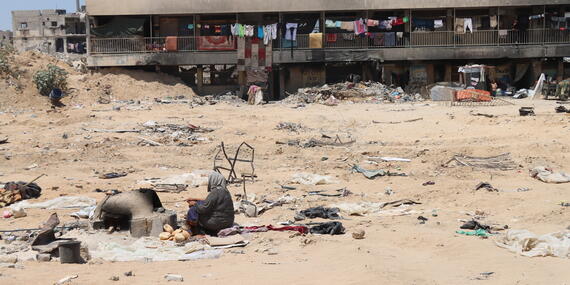Today's top news: Occupied Palestinian Territory, Zimbabwe

Occupied Palestinian Territory
OCHA says relentless hostilities and recurrent evacuation orders in Gaza are driving a seemingly endless cycle of displacement and making it increasingly difficult for people to access the humanitarian assistance they need to survive after 10 months of war.
When malnourished children in Gaza have to flee suddenly, it is extremely challenging for humanitarian partners to monitor and follow up with the necessary services and for displaced families to carry the malnutrition prevention and treatment supplies they need.
Repeated displacement – coupled with insecurity, access constraints and other challenges – also continue to hamper the early detection of children and women in need of nutrition services. These factors also constrain partners’ ability to scale up their operational presence and store life-saving supplies.
The UN and humanitarian partners in Gaza remain committed to delivering critical assistance to people across the Strip wherever and whenever possible.
Partners working on the shelter response in Gaza continue to monitor the movement and needs of newly displaced people in Deir al Balah and Khan Younis and provide support. Since 22 July, they have provided hundreds of tents to families displaced in southern, central and northern Gaza.
Meanwhile, between 22 July and 4 August, 48 of our partners working on the health response in Gaza reached more than a quarter-million people across the Strip. There are also more than a dozen emergency medical teams supporting local health-care workers, including three in northern Gaza.
However, ongoing hostilities and the constant bombardment of Gaza have caused numerous mass casualty incidents in recent weeks that have stretched humanitarian organizations’ ability to respond to trauma and emergency cases.
Poor water, sanitation and hygiene conditions, coupled with overcrowding, is also driving disease outbreaks.
Today, the World Health Organization (WHO) said it is working with UNICEF and the Ministry of Health on a range of measures, including polio vaccination campaigns, following the detection of a variant of poliovirus type 2 in environmental samples in Gaza.
Hanan Balkhy, WHO’s Regional Director for the Eastern Mediterranean, told journalists that although no clinical cases have been detected, the risk to children is high – and we must move rapidly to prevent and contain the spread of the virus. She stressed that a ceasefire, even temporarily, is critical to successfully undertake vaccination campaigns – warning that otherwise, the virus could spread further, including across borders.
In the West Bank, OCHA’s latest report says the killing and displacement of Palestinians and the demolition of their homes and the destruction of the public infrastructure they rely on continue unabated.
Between 30 July and 5 August, 16 Palestinians – including two children – were killed by Israeli forces, nine of them by airstrikes. Another 56 people were injured. During that same period, Israeli settlers also perpetrated more than two dozen attacks against Palestinians, causing injuries and damage to property. There were also five attacks by Palestinians against settlers.
Zimbabwe
OCHA reports that the food security situation in Zimbabwe is deteriorating rapidly following a historic drought caused by El Niño. More than half of the harvest was destroyed and some 7.6 million people are now at risk of acute hunger.
UN Assistant Secretary-General and Climate Crisis Coordinator, Reena Ghelani – alongside the Assistant Executive Director of the World Food Programme, Valerie Guarnieri – recently concluded a week-long mission to assess the impact of the drought and call for more international support for the humanitarian response.
Authorities in Zimbabwe declared a nationwide state of disaster in April. According to their latest figures, at least 57 per cent of people in rural parts of the country – some 5.9 million people – are expected to be food insecure during the peak hunger period between January and March of next year.
The drought has strained Zimbabwe’s economy, with more than a fifth of school-aged children now out of school. It has also led to critical water shortages.
The UN and partners continue to work with the Government to support response efforts. However, the US$429 million flash appeal launched in May, which aims to assist more than 3 million people, is only about 11 per cent funded.
